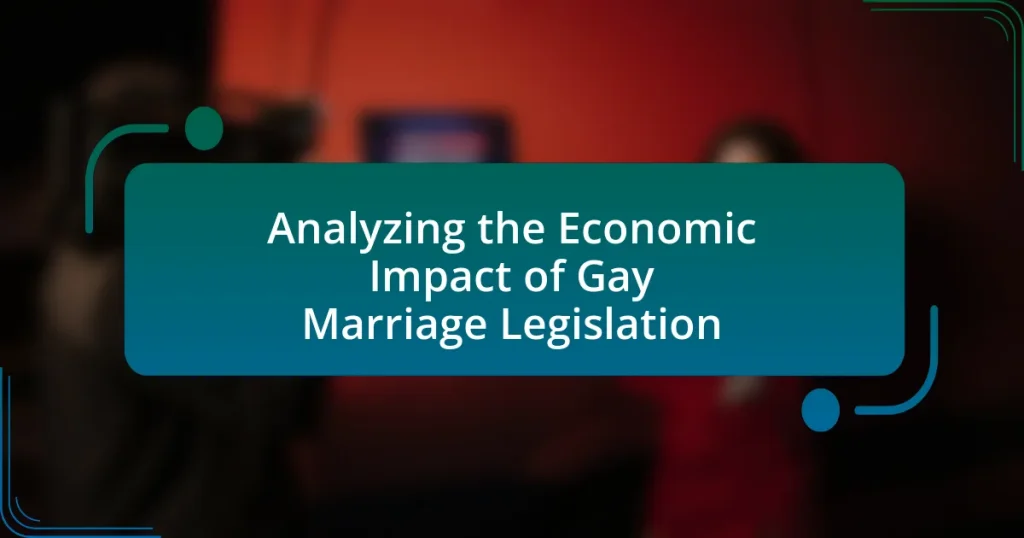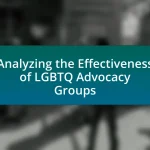The article analyzes the economic impact of gay marriage legislation, highlighting its generally positive effects on economic activity and revenue generation. It discusses how legalizing same-sex marriage leads to increased spending in sectors such as weddings, tourism, and related services, with estimates suggesting a potential $2.5 billion boost in economic activity in the U.S. over three years. The article further explores the influence of gay marriage legislation on economic growth, local economies, taxation, and government revenue, as well as its broader societal implications, including the promotion of equality and social acceptance. Additionally, it examines the specific sectors affected, trends in wedding spending, and the long-term economic effects, emphasizing the importance of inclusivity in legislation for stimulating economic growth.
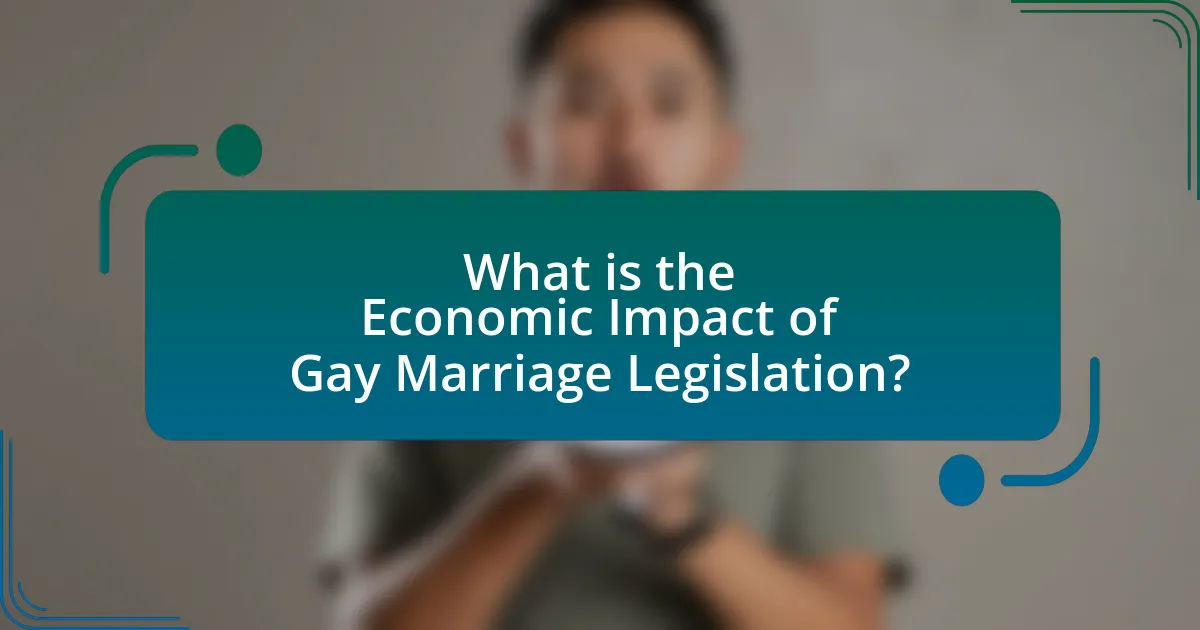
What is the Economic Impact of Gay Marriage Legislation?
The economic impact of gay marriage legislation is generally positive, contributing to increased economic activity and revenue generation. Studies indicate that legalizing gay marriage leads to significant spending in areas such as weddings, tourism, and related services. For instance, a 2014 study by the Williams Institute estimated that legalizing same-sex marriage in the U.S. could generate approximately $2.5 billion in economic activity over three years, primarily from wedding-related expenditures. Additionally, states that have legalized gay marriage often experience a boost in tax revenues due to increased spending by same-sex couples. This economic uplift is further supported by data showing that marriage equality can enhance job creation in sectors like hospitality and retail, as same-sex couples engage in celebrations and travel.
How does gay marriage legislation influence economic growth?
Gay marriage legislation positively influences economic growth by increasing consumer spending and boosting local economies. When same-sex couples gain the legal right to marry, they often spend on weddings, housing, and related services, which stimulates various sectors such as hospitality, retail, and real estate. A study by the Williams Institute found that legalizing same-sex marriage in the U.S. could generate an estimated $2.5 billion in additional spending on weddings and related services in the first three years alone. Furthermore, states that have legalized gay marriage experience an influx of tourism and business investments, as inclusive policies attract a diverse workforce and promote a positive business environment.
What are the direct financial benefits of legalizing gay marriage?
Legalizing gay marriage generates direct financial benefits through increased tax revenue, enhanced economic activity, and reduced government spending on social services. For instance, states that legalized gay marriage experienced a boost in wedding-related spending, which contributes to local economies; a study by the Williams Institute estimated that legalizing same-sex marriage in the U.S. could generate approximately $2.5 billion in spending on weddings and related services. Additionally, legal recognition allows same-sex couples to access tax benefits, such as joint filing, which can lead to increased tax revenue for governments. Furthermore, legalizing gay marriage reduces the burden on social services by providing legal protections and benefits that can decrease reliance on public assistance programs.
How does gay marriage legislation affect local economies?
Gay marriage legislation positively affects local economies by increasing spending in various sectors. When same-sex marriage is legalized, there is often a surge in wedding-related expenditures, including venues, catering, and travel, which can boost local businesses. For instance, a study by the Williams Institute found that legalizing same-sex marriage in the U.S. led to an estimated $2.5 billion in economic activity from wedding-related spending. Additionally, regions that embrace inclusive policies tend to attract more tourists and new residents, further stimulating economic growth.
What are the broader societal implications of gay marriage legislation?
Gay marriage legislation has significant broader societal implications, including the promotion of equality and social acceptance. Legalizing gay marriage fosters an environment where LGBTQ+ individuals are recognized as equal members of society, which can lead to reduced discrimination and increased mental well-being among these populations. Studies, such as those conducted by the Williams Institute, indicate that states with legalized same-sex marriage experience a decrease in suicide rates among LGBTQ+ youth, highlighting the positive impact on mental health. Furthermore, the recognition of same-sex marriages can enhance family stability and economic security, as couples gain access to legal benefits, tax advantages, and healthcare rights. This shift not only benefits the individuals directly involved but also contributes to a more inclusive society, ultimately fostering a culture of acceptance and diversity.
How does gay marriage legislation contribute to social equality?
Gay marriage legislation contributes to social equality by legally recognizing same-sex couples, thereby granting them the same rights and privileges as heterosexual couples. This legal recognition helps dismantle systemic discrimination, as it affirms the equal status of LGBTQ+ individuals in society. For instance, studies have shown that states in the U.S. that legalized gay marriage experienced a decrease in hate crimes and an increase in mental health outcomes among LGBTQ+ individuals, indicating a positive shift towards social acceptance and equality. Furthermore, the legalization of gay marriage has been linked to economic benefits, such as increased spending in the wedding industry and enhanced tax revenues, which further supports the argument that social equality can have tangible economic impacts.
What role does public opinion play in the economic impact of gay marriage?
Public opinion significantly influences the economic impact of gay marriage by shaping legislative decisions and consumer behavior. When public support for gay marriage increases, it often leads to the legalization of same-sex marriage, which can boost economic activity through increased wedding-related spending, tourism, and associated services. For instance, a study by the Williams Institute found that legalizing same-sex marriage in the U.S. could generate an estimated $2.5 billion in economic activity from wedding expenditures alone. Additionally, positive public sentiment can enhance the reputation of businesses that support LGBTQ+ rights, attracting more customers and fostering a more inclusive economy. Thus, public opinion not only drives policy changes but also directly correlates with economic benefits in communities that embrace gay marriage.
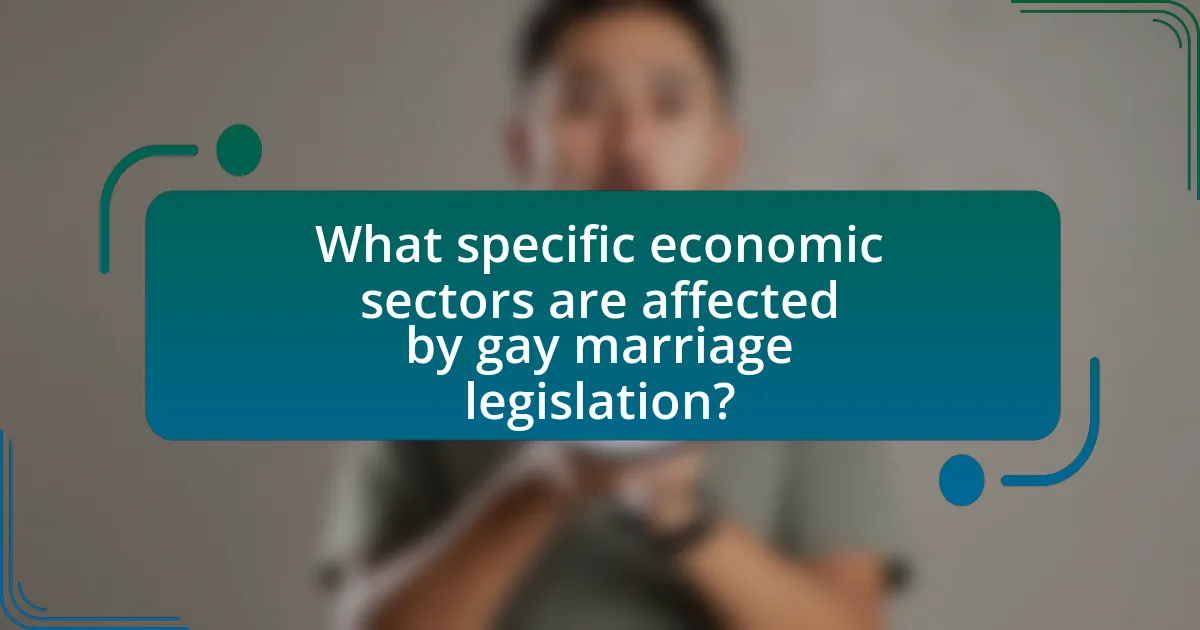
What specific economic sectors are affected by gay marriage legislation?
Gay marriage legislation specifically affects several economic sectors, including the wedding industry, healthcare, taxation, and housing. The wedding industry experiences increased demand for services such as venues, catering, and photography, as same-sex couples seek to celebrate their unions. In healthcare, legal recognition allows same-sex couples to access spousal benefits, impacting insurance markets and healthcare providers. Taxation changes, including the ability to file jointly, can lead to increased tax revenues and altered financial planning for couples. Additionally, the housing market may see shifts as same-sex couples purchase homes together, contributing to real estate growth. These impacts are supported by studies indicating that states legalizing gay marriage experienced economic boosts in these sectors, demonstrating the tangible effects of such legislation.
How does the wedding industry benefit from gay marriage legalization?
The wedding industry benefits from gay marriage legalization by experiencing increased demand for wedding services and products. Following the legalization of same-sex marriage in various regions, the wedding industry has seen a significant rise in revenue, with estimates indicating that same-sex weddings contribute billions to the economy. For instance, a study by the Williams Institute in 2013 estimated that legalizing same-sex marriage in the U.S. could generate approximately $2.5 billion in spending on weddings over three years. This increase in demand encompasses various sectors, including venues, catering, photography, and attire, thereby expanding the overall market for wedding-related businesses.
What trends have emerged in wedding spending post-legalization?
Post-legalization of same-sex marriage, wedding spending has significantly increased, with couples investing more in their ceremonies and receptions. According to a study by The Knot, same-sex couples spent an average of $30,000 on their weddings, which is notably higher than the average spending of heterosexual couples, estimated at $28,000. This trend reflects a growing acceptance and celebration of same-sex unions, leading to increased demand for wedding services and products. Additionally, the wedding industry has seen a rise in specialized vendors catering to LGBTQ+ couples, further driving spending in this sector.
How do same-sex weddings compare to heterosexual weddings in terms of spending?
Same-sex weddings typically involve higher spending compared to heterosexual weddings. Research indicates that same-sex couples often allocate more funds to their weddings, with studies showing that they spend approximately 20-30% more on average. For instance, a study by The Knot in 2021 revealed that same-sex couples spent an average of $34,000 on their weddings, while heterosexual couples spent around $28,000. This increased expenditure can be attributed to factors such as a desire for unique experiences, higher investment in venues, and personalized services.
What impact does gay marriage legislation have on taxation and government revenue?
Gay marriage legislation positively impacts taxation and government revenue by increasing tax contributions from married couples and boosting economic activity. When same-sex couples marry, they gain access to tax benefits such as joint filing, which can lead to higher tax revenues for the government. According to a 2015 study by the Williams Institute, legalizing same-sex marriage in the U.S. was projected to generate an additional $1.2 billion in tax revenue over three years due to increased marriage licenses and related economic activities. Furthermore, the increased spending associated with weddings and celebrations contributes to local economies, further enhancing government revenue through sales taxes.
How does legal recognition of same-sex marriage affect tax policies?
Legal recognition of same-sex marriage significantly alters tax policies by allowing same-sex couples to access the same tax benefits as heterosexual couples. This includes the ability to file joint tax returns, which can lead to lower overall tax liabilities due to the progressive nature of tax brackets. According to a 2015 report by the U.S. Treasury Department, the legalization of same-sex marriage resulted in an estimated $1 billion in additional tax revenue over the following decade, as same-sex couples began to file jointly and claim spousal exemptions. Furthermore, legal recognition enables same-sex couples to inherit assets without incurring estate taxes, similar to heterosexual couples, thereby impacting estate planning and tax obligations.
What are the implications for government benefits and social services?
The implications for government benefits and social services following the legalization of gay marriage include increased access to spousal benefits, tax advantages, and eligibility for social services for same-sex couples. Legal recognition allows same-sex couples to receive the same government benefits as heterosexual couples, such as health insurance, retirement benefits, and social security survivor benefits. For instance, a 2015 study by the Williams Institute found that legalizing same-sex marriage in the U.S. could result in an increase of approximately $3.8 billion in federal tax revenue over the next decade due to increased tax filings from married couples. This shift not only enhances the financial stability of same-sex families but also contributes to the overall economy by increasing consumer spending and reducing reliance on social services.
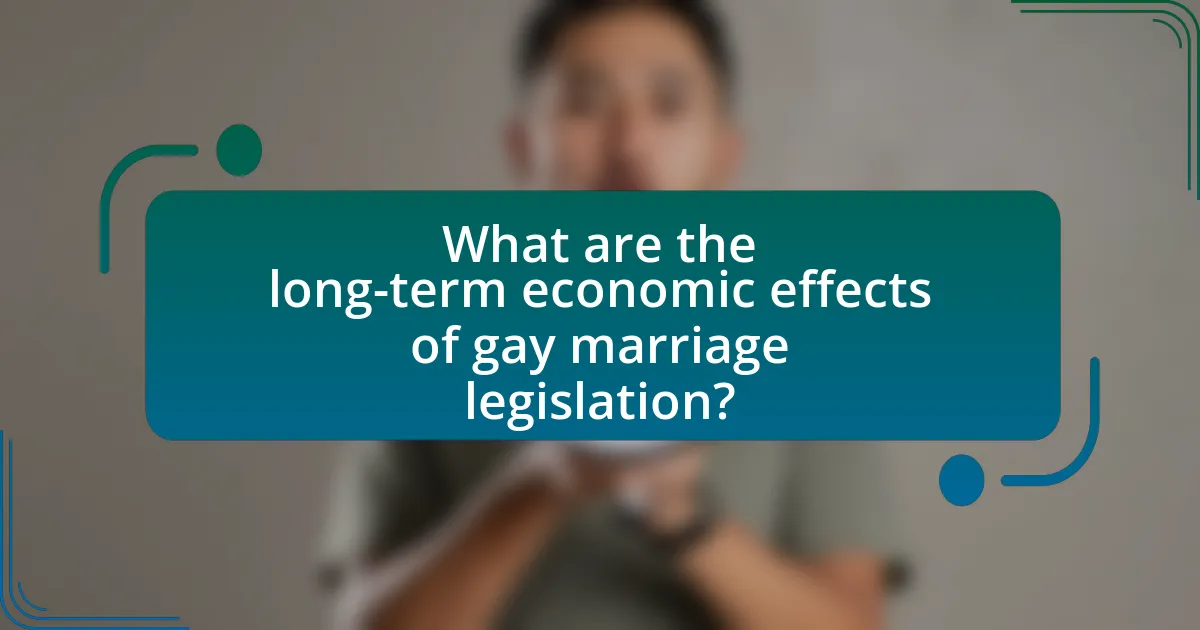
What are the long-term economic effects of gay marriage legislation?
The long-term economic effects of gay marriage legislation include increased consumer spending, enhanced economic growth, and improved public health outcomes. Legalizing gay marriage has been shown to boost wedding-related expenditures, contributing to local economies; for instance, a study by the Williams Institute estimated that legalizing same-sex marriage in the U.S. could generate approximately $2.5 billion in economic activity from weddings alone. Additionally, research indicates that same-sex couples often have higher disposable incomes, which can lead to increased spending in various sectors. Furthermore, studies suggest that legal recognition of same-sex marriage correlates with better mental health outcomes, reducing healthcare costs and increasing productivity, thereby positively impacting the economy.
How does gay marriage legislation influence workforce participation?
Gay marriage legislation positively influences workforce participation by promoting inclusivity and stability for LGBTQ+ individuals. When same-sex marriage is legalized, it often leads to increased job satisfaction and productivity among LGBTQ+ employees, as they feel more accepted and secure in their personal lives. Research from the Williams Institute indicates that states with legalized gay marriage saw a 7% increase in workforce participation among gay men and a 5% increase among lesbians, as these individuals are more likely to enter or remain in the workforce when their rights are recognized and protected. This legislative change fosters a more diverse and engaged workforce, ultimately benefiting the economy.
What are the effects on employee benefits and workplace policies?
The effects on employee benefits and workplace policies due to gay marriage legislation include increased access to spousal benefits and changes in non-discrimination policies. Following the legalization of same-sex marriage, many companies expanded their benefits packages to include same-sex spouses, aligning with legal requirements and promoting inclusivity. For instance, a 2015 study by the Williams Institute found that 88% of Fortune 500 companies offered health benefits to same-sex partners, reflecting a significant shift in workplace policies. Additionally, organizations have adopted more comprehensive non-discrimination policies to protect LGBTQ+ employees, fostering a more equitable work environment.
How does the inclusion of same-sex couples affect labor market dynamics?
The inclusion of same-sex couples positively affects labor market dynamics by increasing overall economic participation and productivity. Research indicates that legal recognition of same-sex marriage leads to higher job mobility and greater workforce engagement among LGBTQ+ individuals, as they experience reduced discrimination and increased job satisfaction. A study by the Williams Institute found that states legalizing same-sex marriage saw a 1% increase in GDP due to enhanced economic activity from same-sex couples, who contribute to consumer spending and housing markets. This economic boost is further supported by evidence showing that same-sex couples tend to have higher disposable incomes, which stimulates local economies.
What lessons can be learned from the economic impact of gay marriage legislation?
The economic impact of gay marriage legislation demonstrates that legalizing same-sex marriage can lead to significant economic benefits for states and local economies. For instance, a study by the Williams Institute found that legalizing same-sex marriage in the U.S. could generate approximately $2.6 billion in spending related to weddings and tourism. Additionally, states that have legalized gay marriage often experience increased tax revenues from wedding-related expenditures and associated services. This economic boost highlights the importance of inclusivity in legislation, as it not only promotes equality but also stimulates economic growth.
What best practices can be adopted from regions that have legalized gay marriage?
Regions that have legalized gay marriage can adopt best practices such as implementing comprehensive anti-discrimination laws, promoting inclusive policies in workplaces, and providing equal access to benefits for same-sex couples. For instance, countries like the Netherlands, which legalized gay marriage in 2001, have seen positive economic impacts, including increased tourism and spending in wedding-related industries. Additionally, studies indicate that regions with inclusive policies experience higher levels of mental health and well-being among LGBTQ+ individuals, which can lead to increased productivity and economic contributions. These practices not only foster equality but also stimulate economic growth, as evidenced by the $3.8 billion boost to the U.S. economy following the Supreme Court’s legalization of same-sex marriage in 2015.
How can policymakers leverage these insights for future legislation?
Policymakers can leverage insights from the economic impact of gay marriage legislation by using data to inform future laws that promote equality and economic growth. For instance, studies have shown that states legalizing gay marriage experienced increased economic activity, with estimates suggesting a boost of approximately $140 million in spending in the first few years post-legalization. By analyzing these economic benefits, policymakers can advocate for similar legislation that fosters inclusivity and stimulates local economies. Additionally, understanding the positive correlation between marriage equality and economic indicators can guide future legislative efforts aimed at enhancing social welfare and economic stability.
What strategies can businesses implement to capitalize on the economic benefits of gay marriage legislation?
Businesses can capitalize on the economic benefits of gay marriage legislation by targeting marketing efforts towards LGBTQ+ couples and offering tailored products and services. By recognizing the increased disposable income of same-sex couples, businesses can create inclusive advertising campaigns that resonate with this demographic, thereby enhancing brand loyalty and customer engagement.
For instance, a study by the Williams Institute found that same-sex couples have a higher average income compared to heterosexual couples, indicating a significant market potential. Additionally, businesses can implement policies that promote inclusivity, such as providing benefits for same-sex spouses, which can improve employee satisfaction and attract top talent from the LGBTQ+ community.
Furthermore, hosting events or partnerships that celebrate LGBTQ+ pride can enhance community relations and visibility, ultimately driving sales and fostering a positive brand image.
